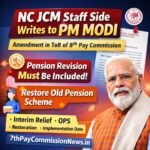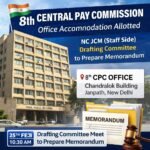Proposal to Include in the Election Manifesto to All Parties – NC JCM Staff Side
Proposal to include in the election manifesto of your party with regard to the scrapping of the National Pension System
“If you will be able to indicate your intention to replace the present new contributory scheme with the old Statutory Pension structure, in your manifesto, it might help immensely to elicit the support of the Central Government employees and their family members to your party candidates in the ensuing general election.”
NJCA
National Joint Council of Action
4, State Entry Road, New Delhi – 110055
No.NC-JCM-2019/NPS
March 8, 2019
To
The Chief Executive,
All Recognised National and State level Political Parties
Sub:- Proposal to include in the election manifesto of your party with regard to the scrapping of the National Pension System which has taken away the pension right of Central Government Employees
Dear Sir I Madam,
We write this on behalf of the organisations of the Central Govemment employees participating in the Joint Consultative Machinery, set up by the Government of India in 1960s as a negotiating forum to settle various demands and grievances of the employees through discussions.
In the meeting that was held on 8th February, 2019, of the Standing committee of the National Council, Staff Side, it was unanimously decided that I in my capacity as the Secretary, Staff side National Council, must write to you to draw your kind attention to one of the most significant demands of the Central Government employees i.e. to replace the newly introduced contributory pension scheme with the old statutory defined Pension system and also to restore the GPF Scheme which was withdrawn by the Government.
I have been asked to seek your support to this vital demand of the employees especially of the young workers who have entered government service after 1.1 .2004 and obtain an assurance from you that you will accede to the demand for the withdrawal of the New contributory scheme to replace it with the old Statutory pension system if elected to power in the ensuing general elections to constitute the 11th Lok Sabha.
Before going into the difficulties being faced by the employees governed under the New Contributory Pension Scheme which is at present christened as “National Pension System (NPS)”, I would like to invite your attention to the historical judgment delivered by the Hon’ble Supreme Court by a 5 Member Bench consisting of Hon’ ble Chief Justice Y.B.Chandrachud. The Hon’ble Supreme Coutt in this case has analyzed in detail the entire issue of Pension. The most impotiant portion of the above historical judgment is reproduced below for your kind consideration please.
“From the discussions 3 things emerge
(i) that pension is neither a bounty nor a matter of grace depending upon the sweetwi/1 of the employer and that it creates a vested rights subject to 1972 Rules which are statutory in character, because they are enacted in exercise of powers conferred by the proviso to Article 309 and Clause (5) of article 148 of the constitution,
(ii) that Pension is not an ex-gratia payment but it is a payment for the past service rendered and
(iii) it is a social welfare measure rendering socio economic justice to those who in the heyday of their life ceaselessly toiled for the employer on an assurance that in their old age they would not be left in the lurch.”
As you are aware Sir/Madam, that the new contributory pension scheme was introduced by the then NDA Government in 2004 initially through an executive fiat. Later, rather much later, a bill was introduced in the Parliament to enact the Pension Fund Regulatory and Development Authority. After the promulgation of the Notification in 2004, many State Governments adopted the scheme to cover their employees, the only exception being the State of West Bengal presently.
The ostentatious reason adduced at the time of promulgation of the Notification and thereafter at the time of the introduction of the PFRDA bill, was the ever increasing financial outflow on pension account, which makes fiscal deficit management difficult. Prima facie the said reason appeared to be true as the quantum of outflow on account of Pension had been on increase. But the fact that it had always been on rise was concealed as also the one that as a percentage to the GDP, the pension payment had been continuously dwindling over the years.
The employees organisations had been pointing out to the Government that the desired objective of containing pension outflow would not come about for the next four decades. When the probable drastic reduction in pension under the new scheme was raised by the Staff Side in the National Council, the Government stated that under the new dispensation, employees will become entitled more annuity than the then existing entitlement of Pension, this assurance was given in writing by Government in the Standing Committee Meeting of the National Council (JCM) held under the Chairmanship of Secretary (Personnel) on 14′h December, 2007 and went on to assure the Government’s intervention if things turns out otherwise. It is also pertinent to mention here that the Government has exempted the Armed Force Personnel from the NPS and they continue to be in the old Pension Scheme. If the NPS is so attractive then why the Government has exempted them from NPS. This is a clear proof that the NPS is vety much detrimental when compare to the old Pension Scheme.
The scheme is presently in vogue for the last 15 years. A few employees who were originally recruited as casual workers but got regularised later (retired before completion of the 33 or 35 years of service.) They were given a paltry amount as pension amounting to less than Rs, 2000. Had they been covered under the old Pension scheme, they would have certainly got more than 20,000 as pension. The new scheme has thus become “NO pension scheme’. The new scheme has thus created consternation of a very high order amongst the employees as they rightly feel that their hard earned savings are in effect compulsorily channelled to benefit the corporate entities. Since the Govt. will have to contribute equal amount or more (now 14%)the same would act in future as a real drain on the resources of the Government and will cause hardship in the form of increased tax liability. The anger and discontent of the employees have manifested itself in huge demonstrations and such other programmes and some of them have even resorted to strike action.
We are proud to mention that our principled opposition to the scheme right from the beginning, when it was introduced by the then NDA Government, has now been vindicated as it neither benefits the subscriber nor the Nation. Incidentally we may point out that in the wake of the 6th CPC, Government agreed to set up an expert committee under the chairmanship of Dr.Gayatri, at the Indian institute of social sciences to look into all aspects of the New Pension scheme. The committee has clearly indicated that the new scheme will draw more funds from the exchequer in the coming 40 years, before any reduction in the outflow could be brought about.
We fervently feel that the new contributory scheme must be replaced by the old Pension Scheme under the CCS (Pension) Rules, 1972. If you will be able to indicate your intention to replace the present new contributory scheme with the old Statutory Pension structure, in your manifesto, it might help immensely to elicit the support of the Central Government employees and their family members to your party candidates in the ensuing general election.
We shall also be grateful for favour of a word in response to this communication from your end.
With kindest regards,
Yours sincerely,
(Shiva Gopal Mishra)
Convener
Source: https://ncjcmstaffside.com




Leave a Reply